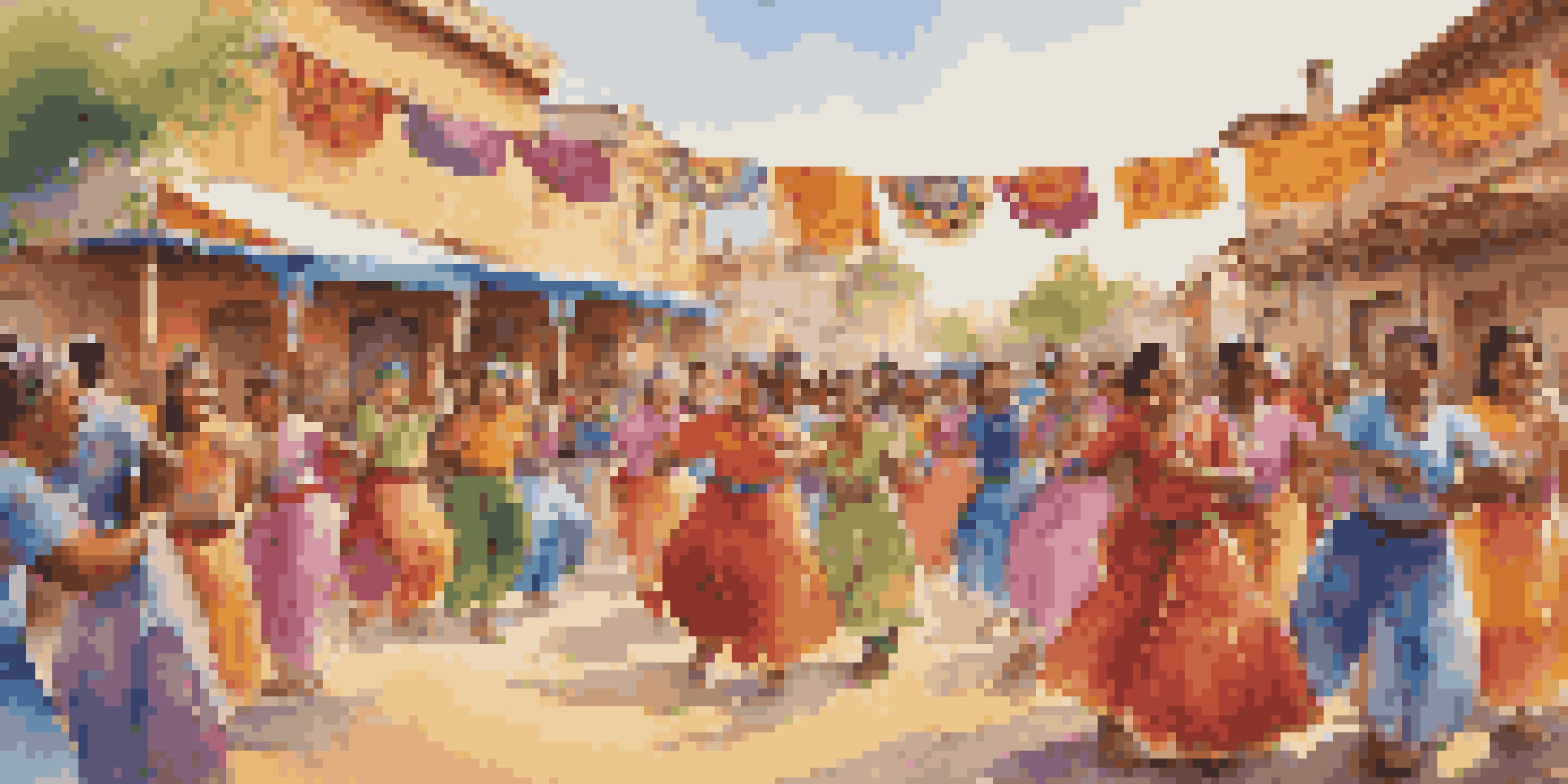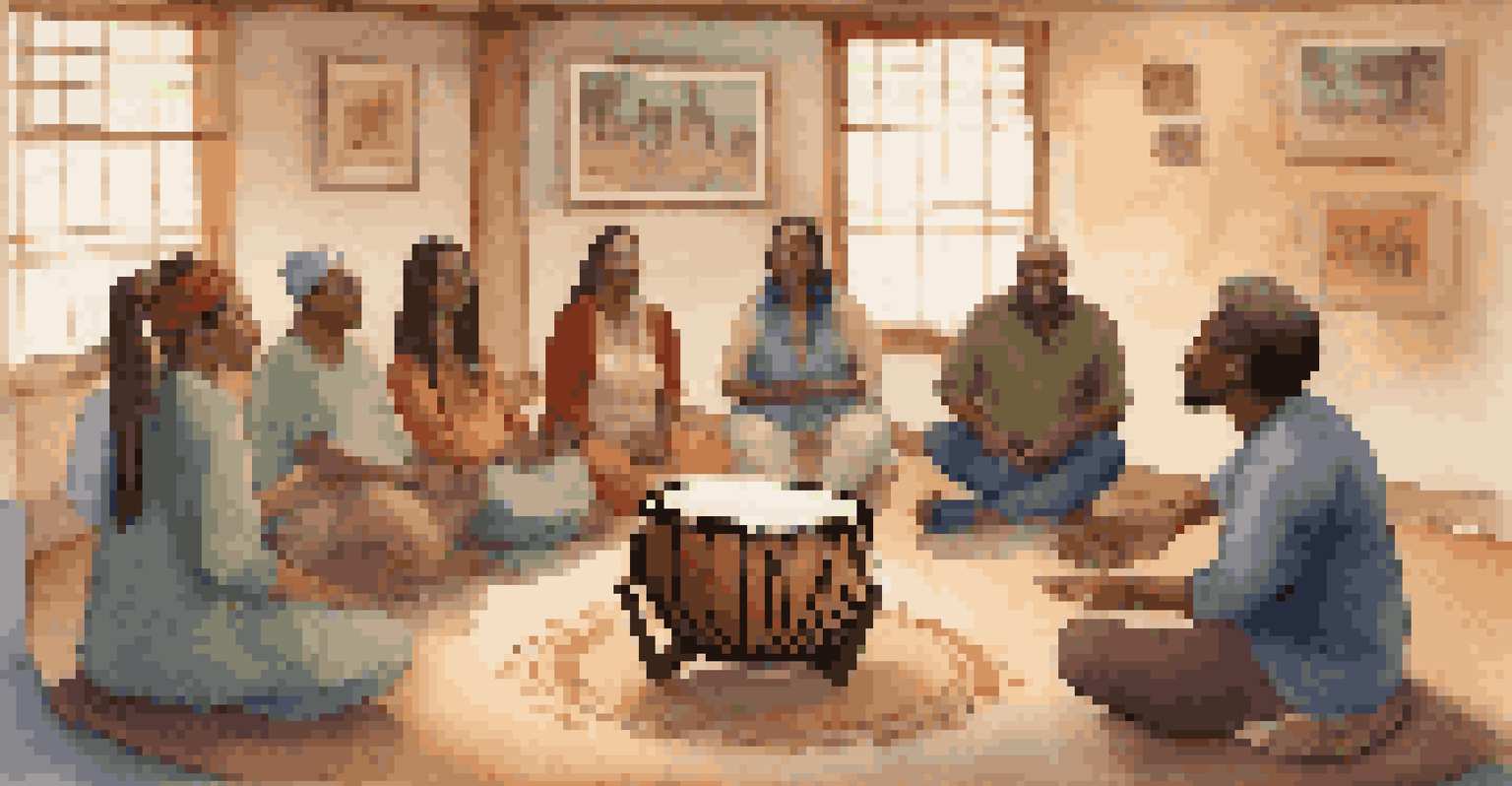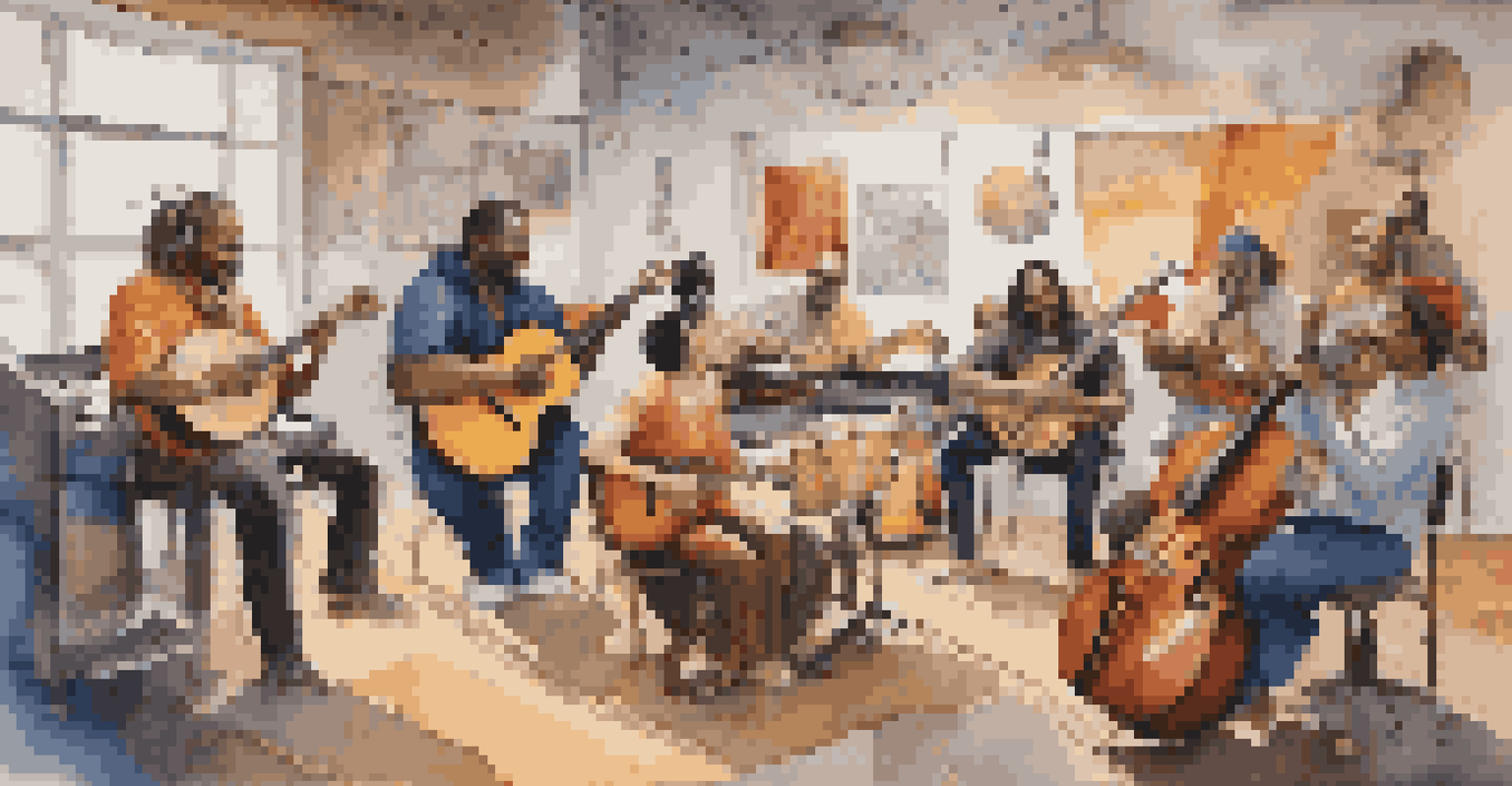The Role of Music in Shaping Multicultural Identities

Music as a Reflection of Cultural Heritage
Music often serves as a mirror reflecting the rich tapestry of cultural heritage. Each genre, from folk to pop, carries the stories and traditions of its people, creating a sense of belonging. For instance, traditional African rhythms can evoke memories of communal gatherings, while classical Indian music connects listeners to centuries-old rituals. These musical expressions allow individuals to celebrate their roots and share their identity with others.
Music is the universal language of mankind.
As people migrate, they bring their musical traditions with them, leading to a fusion of sounds and styles that enrich the cultural landscape. This blending not only preserves heritage but also fosters a new, collective identity that incorporates elements from various backgrounds. For example, the rise of reggaeton showcases how Latin and Caribbean influences can merge to create something entirely fresh while honoring the past.
Ultimately, music acts as a powerful vessel for cultural storytelling, allowing communities to express their unique experiences and histories. Through songs and melodies, we can trace the journeys of different cultures and appreciate the beauty of their diversity. This connection to heritage through music helps individuals navigate their identities in a multicultural world.
The Role of Music in Community Building
Music has an incredible ability to bring people together, fostering a sense of community. Whether it’s a local festival featuring traditional music or a modern concert celebrating diverse artists, these events create shared experiences that strengthen social bonds. For instance, community choirs often unite individuals from various backgrounds, allowing them to collaborate and connect through the universal language of music.

Moreover, music can serve as a catalyst for dialogue and understanding among different cultural groups. When diverse communities come together to appreciate each other's musical styles, they create spaces for learning and empathy. This interaction often leads to collaborations that blend various influences, resulting in unique art forms that reflect a multicultural perspective.
Music Reflects Cultural Heritage
Music serves as a mirror to cultural heritage, enabling people to express their identities and celebrate their roots.
As people share their musical tastes and experiences, they break down barriers and build relationships. This kind of community engagement not only enriches individuals but also cultivates a sense of belonging in a multicultural society. Through music, we can celebrate our differences while also discovering our shared humanity.
Music and Identity Formation in Youth
For many young people, music plays a pivotal role in shaping their identities. As they navigate adolescence, they often turn to music to express their feelings, beliefs, and cultural affiliations. Genres like hip-hop or K-pop often resonate deeply with youth, providing them a sense of agency and a voice in a complex world. These musical styles can reflect their struggles, aspirations, and cultural backgrounds, allowing for personal exploration.
Where words fail, music speaks.
Additionally, music can help young individuals connect with their heritage in a meaningful way. When they engage with traditional songs or contemporary adaptations, they are not just preserving cultural practices but also redefining them for a new generation. For example, a young person might remix a traditional folk song, blending it with modern beats, which allows them to honor their roots while also expressing their individuality.
As they explore various musical genres, young people often form identities that are multifaceted and dynamic. This exploration encourages acceptance of diversity and fosters an appreciation for the broader world. In doing so, music becomes a powerful tool for self-discovery and cultural expression.
The Influence of Globalization on Music
In today's interconnected world, globalization has profoundly impacted music and cultural identities. Through technology and social media, artists from different corners of the globe can share their work instantly, leading to a rich exchange of musical ideas. For instance, platforms like Spotify and YouTube allow users to explore sounds from various cultures, breaking down geographical barriers.
This global exchange has led to the emergence of new genres that blend different musical influences. Take the rise of Afrobeat, which combines traditional African rhythms with jazz and funk elements; this genre has not only gained popularity in Africa but also captivated audiences around the world. Such cross-pollination of genres encourages listeners to embrace and celebrate multicultural influences in their music.
Music Fosters Community Connection
Through shared musical experiences, communities can build social bonds and promote understanding among diverse cultural groups.
However, globalization can also pose challenges, such as the risk of cultural appropriation. As music becomes more widely accessible, it's essential to approach cultural expressions with respect and acknowledgment of their origins. By promoting genuine appreciation and understanding, we can ensure that music continues to serve as a bridge between cultures rather than a tool for commodification.
Music as a Means of Political Expression
Throughout history, music has been a powerful vehicle for political expression and social change. Artists often use their platforms to address pressing issues such as inequality, injustice, and human rights. Songs like Bob Dylan's 'The Times They Are a-Changin'' resonate deeply, reflecting the sentiments of a generation seeking change and justice.
In multicultural societies, these musical expressions can highlight the struggles and aspirations of various communities. For instance, the rise of protest music in the wake of social movements demonstrates how artists can galvanize support and foster solidarity among diverse groups. This unifying effect enables individuals to rally together around shared causes, amplified by the emotional resonance of music.
By using music as a form of activism, artists contribute to the ongoing dialogue about identity and belonging. They challenge listeners to reflect on their values and the world around them. In this way, music not only entertains but also educates, inspiring people to engage with their communities and advocate for change.
The Healing Power of Music in Multicultural Contexts
Music has long been recognized for its therapeutic abilities, particularly in multicultural contexts where it serves as a bridge for healing and understanding. In times of trauma, music can provide solace and a sense of connection, helping individuals process their emotions and experiences. For example, community drumming circles allow people to come together, express their feelings, and release stress in a supportive environment.
Moreover, music therapy has become an essential tool in addressing mental health challenges across diverse populations. By incorporating culturally relevant music into therapeutic practices, therapists can create a safe space for individuals to explore their identities and experiences. This approach acknowledges the importance of cultural context in healing, ensuring that therapy resonates with clients on a deeper level.
Globalization Shapes Musical Identity
Globalization allows for the blending of musical influences, creating new genres while also raising concerns about cultural appropriation.
Ultimately, the healing power of music extends beyond individual experiences; it can foster communal resilience. As people come together to share their stories through music, they build a sense of solidarity and support. This collective healing reinforces the idea that music can be a powerful force in nurturing multicultural identities and promoting well-being.
The Future of Music and Multicultural Identities
As we look to the future, the role of music in shaping multicultural identities is poised to evolve even further. Technological advancements will continue to facilitate the exchange of musical ideas, enabling artists to experiment and collaborate in unprecedented ways. Imagine a world where a musician from one country can seamlessly collaborate with another from a different culture, resulting in innovative sounds that reflect a shared global identity.
Moreover, as societies become increasingly diverse, the demand for inclusive representation in the music industry will grow. Audiences will seek out artists who authentically reflect their experiences and backgrounds, leading to more opportunities for underrepresented voices. This shift could inspire a broader appreciation for the richness of multicultural music, encouraging labels and producers to embrace diversity.

Ultimately, the future of music will likely be characterized by a celebration of multicultural identities, where artists draw from their unique backgrounds to create new forms of expression. As we continue to navigate an interconnected world, music will remain a vital force in shaping who we are and how we connect with one another.